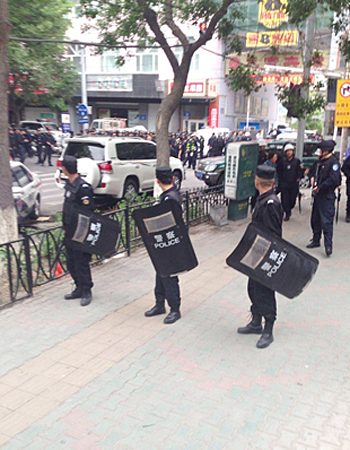|
 |
|
CORDONED OFF: Police officers block a road leading to the scene of explosions set off by terrorists near a market in Urumqi, Xinjiang Uygur Autonomous Region, on May 22 (CAO ZHIHENG) |
According to figures released by the Xinjiang police force on May 25, 23 terrorist and religious extremist groups were taken down in the Hotan, Kashgar and Aksu prefectures earlier this month in a bust where more than 200 suspects were caught and more than 200 explosive devices were seized.
"The raids have been a deterrent to terrorists, and were also a concerted action to pressure others involved in terror activities to turn themselves in," said Xu Jianying, a research fellow with the Research Center for Chinese Borderland History and Geography at the Chinese Academy of Social Sciences.
Xu made the comments in response to an official statement issued on May 24 that called on those involved in terrorist activities to surrender to the authorities.
The statement stated that those involved in terror-related activities would be given mitigated punishments if they turn themselves in within 30 days. It also encouraged the public to notify the authorities of any information that they are able to provide.
Xu believes tip-offs and voluntary surrenders will lead to an intelligence boost for the authorities. "We can expect that these raids will last at least one or two more months," he said.
According to Xu, sometimes, local authorities only deal with terrorist attacks in a case-by-case manner. Xu commented that this method is incapable of rooting out the entire terrorist network.
The Xinjiang police force said that "uncompromising and innovative tactics" will be used in the ongoing anti-terror campaign. Some key figures related to terrorism and religious extremism will be put under control, and key villages and towns will be monitored and brought back under control, they added.
Yang Shu, Director of the Institute for Central Asian Studies at Lanzhou University in northwest China's Gansu Province, said that the move is aimed at rooting out religious extremism, the deep-rooted cause of Xinjiang's terrorist activity. "Ring leaders may be able to identify those who have already participated in the spreading of religious extremism or those who are likely to be approached, such as unemployed youngsters," Yang said.
Li Wei, an anti-terrorism expert at the China Institutes of Contemporary International Relations, shared similar sentiments, adding that some villages where illegal preaching activities are prevalent will also be targeted.
"However, despite the emphasis of the uncompromising crackdown, the campaign will still be carried out within the framework of law," Li said, regarding it as a strengthening of existing measures.
Long-term solution
Speaking at the second central work conference on Xinjiang, which was held in Beijing from May 28-29, President Xi stressed that the basic principle for easing religious tensions is to protect legal religious activities, deter illegal and extreme ones, guard against infiltration and crack down on crime.
Xi said that people's normal religious demands should be protected in accordance with laws and regulations and their customs should be respected. "Legal channels for religious believers to obtain accurate and correct religious information should be broadened," he added.
In 2013, the East Turkistan Islamic Movement, which is listed by the UN Security Council as a terrorist group, produced 107 pro-terror video and audio items, some of which were spread within China, according to Nuriman Rozi, a senior police officer with the Xinjiang Regional Public Security Department.
Many of the terror suspects seized in recent years were influenced by these and other similar pro-terror video and audio productions, Rozi commented.
A lack of education among the young could easily lead them to misinterpret Islamic teachings, leave them vulnerable to the influence of extremists, and make it difficult for them to find jobs that would provide them with a better life, said a report of Xinhua News Agency.
Along with tough anti-terror moves, central and regional authorities have adopted measures to improve the quality of life by securing jobs and education opportunities for people in Xinjiang.
Employment is the biggest issue concerning people's livelihood, Premier Li Keqiang said at the Xinjiang work conference, urging all enterprises and investment projects in Xinjiang to try their best to employ local residents.
Efforts will be made to promote handicrafts with distinctive ethnic features and residents in the region will be encouraged to work in other parts of the nation, Li added.
The government also plans to help local people, especially the young, to learn to speak and write in standardized Mandarin Chinese, which will help bring more opportunities to them.
The meeting decided that special policies will be issued concerning the development of south Xinjiang, which has harsh geographical features that contribute to its lower living standards.
In accordance with a policy package unveiled at the meeting of the Political Bureau of the CPC Central Committee on May 26, the Party leadership vowed to ensure that at least one person from every "zero-employment" family in Xinjiang is offered a job and free senior high school education is available to children in south Xinjiang. Children in China are generally entitled to nine years of free education, covering primary and junior high schools.
"Improving people's livelihood, with focus on employment and education, is a fundamental touch to address the threat of terrorism. It's of vital significance to give young people the confidence that they have a promising future," said Yu Deqing, a commentator with The Beijing News.
| 